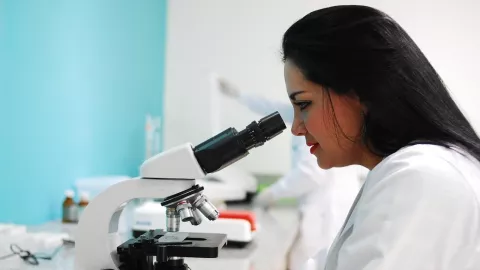
What connects autoimmune conditions? Four things we learnt from BBC’s Woman’s Hour
We’re partners in Connect Immune Research – a project trying to link the science of autoimmune conditions. Last week, BBC Radio 4’s Woman’s Hour programme spoke about it in a special episode on women’s health.
Autoimmune conditions come about when our immune systems mistakenly attack our own cells. This happens in MS, and myelin gets damaged as a result.
But there are also other autoimmune conditions, like type 1 diabetes and rheumatoid arthritis. Scientists think understanding the biology linking them could help to find treatments for everyone.
Woman’s Hour spoke to Professor Lucy Walker from University College London about the Connect Immune Research partnership. Here’s what we learnt...
1. Some people live with several autoimmune conditions
In fact, up to a third of people in the UK with an autoimmune condition actually have more than one. Like Nina, who was interviewed on the show.
Nina started getting MS symptoms aged 22. She got a diagnosis five years later, precisely when her ulcerative colitis (an inflammatory bowel disease) first flared up. And then psoriasis (a skin condition) followed suit. Not everyone with an autoimmune condition has more than one - most people (2 in every 3) don't.
2. Autoimmune conditions are more common in women
Women make up around 80% of everyone in the world with an autoimmune condition. MS is two or three times more common in women than men. So is rheumatoid arthritis. And a condition called lupus is six times more common in women.
Scientists don’t yet know why. But they think women’s immune systems generally tend to mount a stronger attack against potential infections. Unfortunately, this could mean women are also more susceptible to the case of mistaken identity that results in the immune system attacking our own cells.
3. Hormones can alter our immune responses
We know men and women can have different levels of sex hormones like testosterone and oestrogen. So could that be playing a role? Well Lucy explained that many different types of immune cells do actually interact with sex hormones.
And she said that hormonal changes can alter our immune responses. Interestingly, research shows that women who are pregnant often experience fewer MS relapses. And scientists think this is perhaps because of hormone level changes. But there’s still a lot to learn here.
4. We need to understand what ties these conditions together
We need research to connect the scientific dots between conditions that look quite different, but all involve our immune systems mistaking our own cells for invaders.
Connect Immune Research, funded by charities like Versus Arthritis and Alopecia UK as well as us, is doing just that. The idea is to bring together scientists who work on individual autoimmune conditions. And we’ve already funded one study exploring the role of a substance called interferon in different autoimmune conditions.



